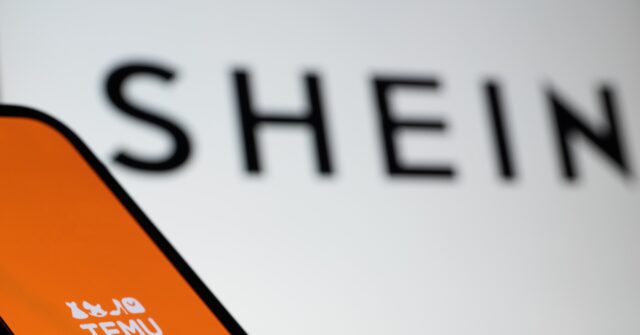Ecuador’s Production and Foreign Trade Ministry announced on Monday all packages shipped from China by companies such as Temu and Shein under a specialized personal courier shipping modality will be subject to a $20 tariff.
The measure, which will go into effect on Monday, June 16, aims to protect local production and curb the “informal commercial use” of the specified courier mechanism, which was originally intended to facilitate the import of items of exclusive personal use.
Ecuador’s current customs regulations feature a “4×4 Courier” import policy that grants packages containing personal, non-commercial goods waivers on foreign trade tariffs and value added taxes (VAT) – so long as the packages weigh four kilograms or less and are valued at $400 or less. Individuals may import up to $1,600 worth of personal merchandise per year using the 4×4 Courier regime. Certain items – such as laptops, cell phones, or liquor – are reportedly prohibited from importing under said waiver regime.
The Ecuadorian government explained that the total volume of imports shipped under the 4×4 Courier modality grew 392 percent over the past four years, going from $102.7 million in 2020 to $502 million in 2024. Furthermore, the number of packages imported grew 637 percent, going from 879,000 to 6.5 million packages in that same time period.
The government estimated that at least 68 percent of the content of the packages corresponds to clothing or footwear, which are “sensitive products for domestic production.”
The growth in imports, the government stressed, has had “serious consequences” for Ecuador’s national productive sectors, incurring losses of more than $69 million and a seven-percent reduction in adequate employment in the textile sector. The Ecuadorian government also documented an eight-percent drop in sales in the footwear industry, mainly affecting local micro-enterprises that make up 97 percent of the entire sector.
The Ecuadorian Foreign Trade Committee (COMEX) passed a resolution on Monday imposing a $20 flat tariff on every package imported under the 4×4 Courier regime starting on June 16. According to the Ecuadorian government, the tariff aims to protect formal employment and Ecuadorian production, promote fair and equitable trade, avoid unregulated commercial use of the 4×4 regime, and correct market distortions affecting formal importers.
The Ecuadorian government detailed that packages sent by Ecuadorian migrants rightfully registered at their corresponding embassy or consulate will not be affected by the tariff, as local customs regulations grant tax waivers to specific packages sent by migrants to their registered families upon obtaining a certificate from the local customs service.
Ecuadorian Deputy Production Minister Andrés Robalino told the local outlet Primicias that authorities have detected “abuse” of the system by platforms such as Temu or Amazon and local illicit markets take advantage of the policy through the use of multiple ID and credit cards to bypass yearly limits and evade taxes.
“In the last year alone, the textile industry has lost between 7% and 8% of jobs, and the footwear sector up to 11%,” Robalino said. “This means that there are Ecuadorian jobs that are being lost due to the misuse of this tool.”
The head of the Guayaquil Chamber of Commerce Miguel Ángel González told Primicias that the government expects to regulate e-commerce platforms in the near future.
“Yes, it is unequal competition that products enter without paying taxes, when the formal trader does,” González said.
The “Much Better Ecuador” corporation, which groups companies locally producing under a Ecuadorian seal of quality, reportedly celebrated the government’s announcement and called for stricter control of international e-commerce platforms. “It’s not protectionism, it’s responsibility,” the group said, proposing a roadmap for strengthening customs control, applying value added tax to foreign platforms, and a comprehensive reform of the current courier policy.
Primicias reported in March that a surge in Temu package imports had “collapsed” local shipping distribution companies, which were in search of small businesses willing to serve as Temu dispatch points to help alleviate their backlogged logistics and comply with delivery times.
Temu and Shein are Chinese e-commerce outlets specializing in selling a large selection of goods at discounted prices. Shein focuses on selling “fast fashion” clothing to young women, while Temu sells clothing in addition to household goods, art supplies, and other items. Multiple reports, including investigations by the U.S. Congress, have found links between suppliers of these companies and “forced labor,” a form of slavery.
“Temu is doing next to nothing to keep its supply chains free from slave labor,” Rep. Mike Gallagher (R-WI), the chair of the House Select Committee on the Chinese Communist Party, said following the publication of a report on slavery in Chinese supply chains. “At the same time, Temu and Shein are building empires around the de minimis loophole in our import rules – dodging import taxes and evading scrutiny on the millions of goods they sell to Americans.”
De minimis was a tariff and inspection loophole for international packages similar to Ecuador’s tariff waiver policy. President Donald Trump closed the de minimis loophole as part of his tariffs on American trade partners this year.
Christian K. Caruzo is a Venezuelan writer and documents life under socialism. You can follow him on Twitter here.
Read the full article here
